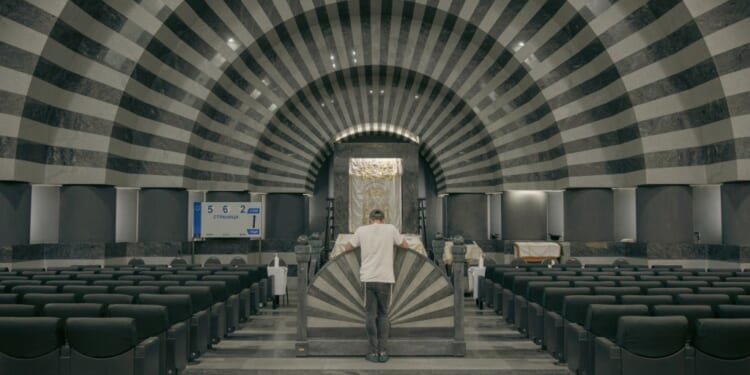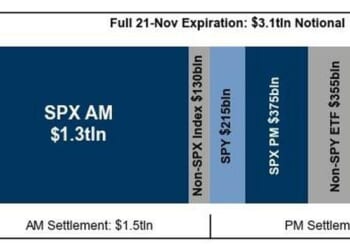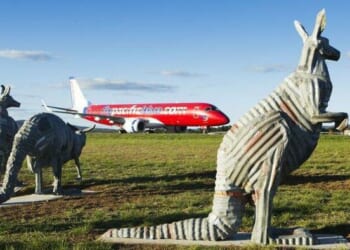Editor’s Note: This is the second of two stories on Jewish life in Ukraine. Click here to read the first.
DNIPRO, Ukraine—On the eve of Rosh Hashanah, the Menorah Center in Dnipro lights up. Opened in 2012, this monumental complex, seven glass towers rising like the branches of a ritual candelabrum, is considered the largest Jewish center in the world.
Synagogue, hotel, museum, conference halls, and restaurants: It’s a city within a city, built thanks to two patrons with controversial fortunes, oligarchs Ihor Kolomoysky and Gennadiy Bogolyubov. Wealthy businessmen accused of corruption but pillars of the community, they wanted to make Dnipro a capital of Eastern European Judaism, on par with Jerusalem or New York.
That evening, before prayer, the faithful gather upstairs in the synagogue. In front of the library, tables covered with glasses of tea turn into an agora. Voices rise, passionate, at the border of religion and politics.
At the center sits Shiman, 73, with a dark face, an uneven beard under a red cap. A former freestyle wrestler and veteran of the Soviet Union’Afghan war of the 1980s, he recounts with pride: “I was in Cherkasy two weeks ago. First place in freestyle wrestling among veterans!” Cherkasy is a rural city in central Ukraine, once home to a large Jewish community exterminated during the Holocaust.
His friend Alexander interrupts him, half-smiling, half-provocative: “Yes, but for a Jew, traveling there … it’s not always simple, is it?” implying that the region remains antisemitic.
Shiman bangs his fist on the table, shouting that Jews and Ukrainians are part of the same nation and that many Ukrainian historical figures were favorable to the Jewish community. Without answering his friend, he launches into a panegyric on the Ukrainian anarchist Nestor Makhno, often wrongly accused by Soviet propaganda of being behind many pogroms during the Russian civil war of 1920.
Another man nods: “Nestor Makhno at least forbade pogroms, ordering his men not to touch Jews—but [Symon] Petliura, that’s another story,” he adds, recalling the Ukrainian leader still accused of covering up or encouraging deadly pogroms between 1917 and 1921. Alexander presses further: “And Bandera? A hero for some, yet his followers took part in massacres of civilians, including Jews, in the 1940sso how are Ukraine’s Jews supposed to feel about that?”
Voices overlap, ignite. The question falls abruptly, like a verdict: “Are we Jews first, or Ukrainians first?” The question has plagued Ukrainian Jews for decades, and in light of Russia’s brutal invasion three years ago, it remains one they continue to ask themselves and each other.
Silence lasts only a second, broken immediately by murmurs of disagreement. Some argue that Jewish identity comes first, inherited like a scar. Others respond that it combines with Ukrainianness, despite the wounds of history. The dispute swells, just minutes before the service, as if spiritual urgency fanned the passions.
Then Haim Wolf, 45, raises his hand. His deep voice calms the uproar. He speaks slowly, as if weighing every word: “Ukraine’s president is Jewish. And like in every country, not everyone likes their president. It’s true some people might blame all Jews for [Volodymyr] Zelensky’s decisions, but we are Ukrainians like everyone else. We all have friends or family currently fighting at the front, don’t we?”
Alexander nods, and so does Shiman, before the discussion flares up again.
Shiman, more lenient, resumes in dialogue with Naim: “The question, ‘What does it mean to be Jewish in Ukraine in 2025?’ is very difficult. In my opinion, it is still a distinct identity, sometimes separate. Many Jews here speak Russian; it’s historical, it’s also part of our identity. Even in Lviv, many Jews speak Russian.
“So, do Jews in Ukraine feel Jewish first, or Ukrainian first? I think they feel Jewish above all. Of course, they are Ukrainian too, but Jewish identity remains primary.”
Shiman and Alexander agree that despite the Holocaust, the Soviet Union, the struggles of the post-Soviet ’90s, and the war, their community has survived through the years and still has a future ahead of it. “Many left for Israel or the U.S.,” sighs Shiman, “but thank God we still have many families and small children, so Baruch Hashem, we still have a strong community, one of the strongest in Europe.”
The voices settle. At that very moment, the New Year’s prayer begins in the great synagogue. Rabbi Shmuel Kaminetsky, Dnipro’s shaliaḥ, an emissary of the Chabad movement sent to build and guide Jewish life in the city, walks through.
In Dnipro, the city where Rabbi Menachem Mendel Schneerson—the last Lubavitcher Rebbe and a near-messianic figure for many Jews—grew up, Kaminetsky is above all known for his conciliation and for more than 30 years of work among post-Soviet Jews. Reserved before the service, the rabbi resolves his congregants’ disagreement: “Every Jew, no matter where he comes from, is above all a Jew. But he serves the country in which he lives.”
Alexander smiles and concludes: “Anyway, you know what they say: two Jews, three parties. They say the same about Ukrainians.”
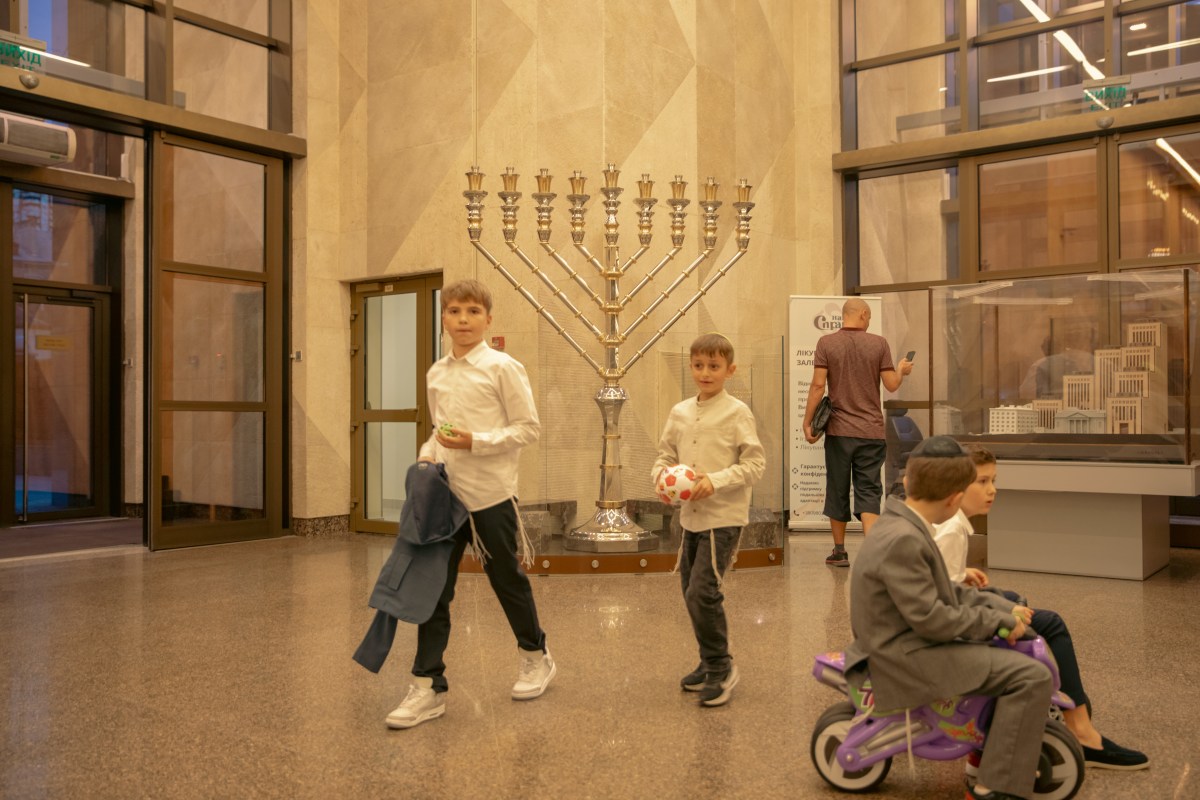
‘A miracle.’
In Odesa, a port city on the Black Sea about 250 miles from Dnipro, a small crowd stirs in front of the synagogue on Uspenska Street.
The New Year enters its final evening. Rabbi Avraham Wolf, lost in prayer, greets each new worshipper with a friendly look as they enter the synagogue to pray.
Born in Israel, Wolf arrived in Odesa as a Chabad shaliach in 1992 to help rebuild the Jewish community after the fall of the Soviet Union.
“It’s a miracle,” Wolf says. “More than 40 percent of our members, at the start of the war, left abroad, and yet the synagogue is fuller than ever.”
“There’s a Ukrainian proverb that says when there’s an air raid siren, people don’t run to the shelters, but run to God,” he says with a smile. This need to draw closer to God in the face of war’s suffering, he explains, accounts for a spiritual revival occurring in Odesa. Igor Chatrin tempers his rabbi’s enthusiasm. “There are only 20,000 Jews left. The impact of the war has been unprecedented.”
With a youthful face framed by a short blond beard, Chatrin, 34, is a native of the city. But he also lived in the United States and Israel before returning to Ukraine. “Many have left and will not return. They are in Israel or Germany,” he says. “Their children are learning the language, going to school, and they’ve settled. They won’t come back.”
Between neoclassical buildings shaded by overgrown trees, the traveler may glimpse the glorious memory of what Jewish writer Isaac Babel once called “the star of exile.” “From its founding in the 18th century, Jews from all over the Russian Empire, particularly from Brody in Galicia, settled in Odesa and contributed to the city’s development,” explains Isabelle Nemirovski, a scholar of Jewish and Hebrew studies at INALCO in Paris and author of History, Memory, and Representation of Odesa’s Jews: An Old Intimate Dream. “Before the [Holocaust], a third of Odesa’s population was Jewish—about 200,000 people.”
Two hundred years later, after World War II, the Holocaust, Stalinist terror, and the fall of the Soviet Union, what remains of Odesa’s Jewish community struggles to survive. Russia’s invasion of Ukraine in February 2022, which included Odesa as one of Russia’s targets, seemed once again to mark the end of Jewish life in the port city. In the war’s first weeks, the community organized the evacuation of thousands of its members to Israel and Germany. “We went from 35 percent Jewish in Odesa before the [Holocaust] to less than 3 percent today,” Chatrin says with a sigh.
Rabbi Wolf, whose life has been dedicated to strengthening Jewish life in the city, reluctantly agrees with his right-hand man’s analysis. “It’s true,” he admits, “no one will return.” Yet paradoxically, the community is now more determined than ever to maintain its traditions and identity. “The specter of war has created a kind of shock and a survival instinct for what remains of Odesa’s small Jewish community,” Nemirovski explains.
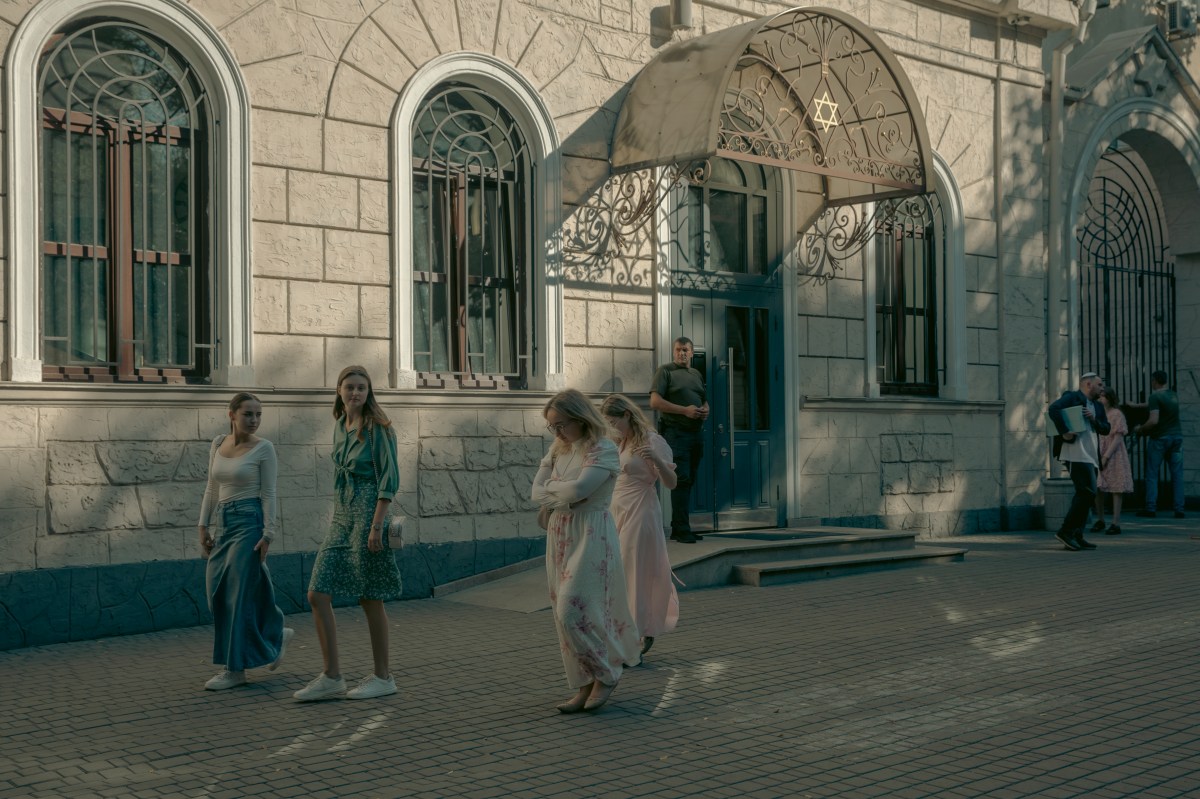
Jewish Odesa.
Not far away, in an inner courtyard with dilapidated façades, children from the orphanage have improvised a soccer field. Inside the building, a woman stands before a plastic table covered with food, her face full of anxiety, speaking with Chaya, Rabbi Wolf’s wife. Beside her, her 8-year-old son plays with a small plastic car given earlier by a congregant. “It’s the day of his circumcision,” explains Rabbi Wolf’s wife.
“Because of the Soviet Union, many families became completely secularized, even neglecting to circumcise their sons,” she says. But in recent years, throughout the former USSR, including Ukraine, hundreds of Jewish families have been seeking to reconnect with their traditions and faith. “The phenomenon, since the beginning of the war, has only intensified.”
Aaron Kramer, the community’s circumciser, says he is overwhelmed: “We can do up to five circumcisions a week.” With his face framed by long curled sidelocks, Kramer, in his 40s, prepares his instruments. Dressed in a white medical tunic, he disinfects his hands. “We can circumcise babies at eight days old, as tradition requires, but also young men and even the elderly.” He recalls that less than a year ago, an 83-year-old man came to him for circumcision. “After his wife’s death, he came to the synagogue for Rosh Hashanah. It was the first time he had ever entered a synagogue. He then learned that we were circumcising six men of all ages and asked if he could also do it.”
This return to Judaism gives Rabbi Wolf hope. “Paradoxically, our community has never been as alive as since the war began. This is, of course, explained by the Jews’ desire to turn to God during a crisis, but also because we have absorbed part of the Jewish community from cities like Mariupol and Dnipro,” Wolf says. “They now make up almost a third of our congregants.”
But Wolf knows that Odesa’s golden years belong to another time. Chatrin, for his part, tries to reassure his rabbi and remains hopeful: “I hope that after the war Odesa will be reborn, stronger than ever, and that some of our people will return. In any case, Odesa without its Jews is no longer truly Odesa.”

